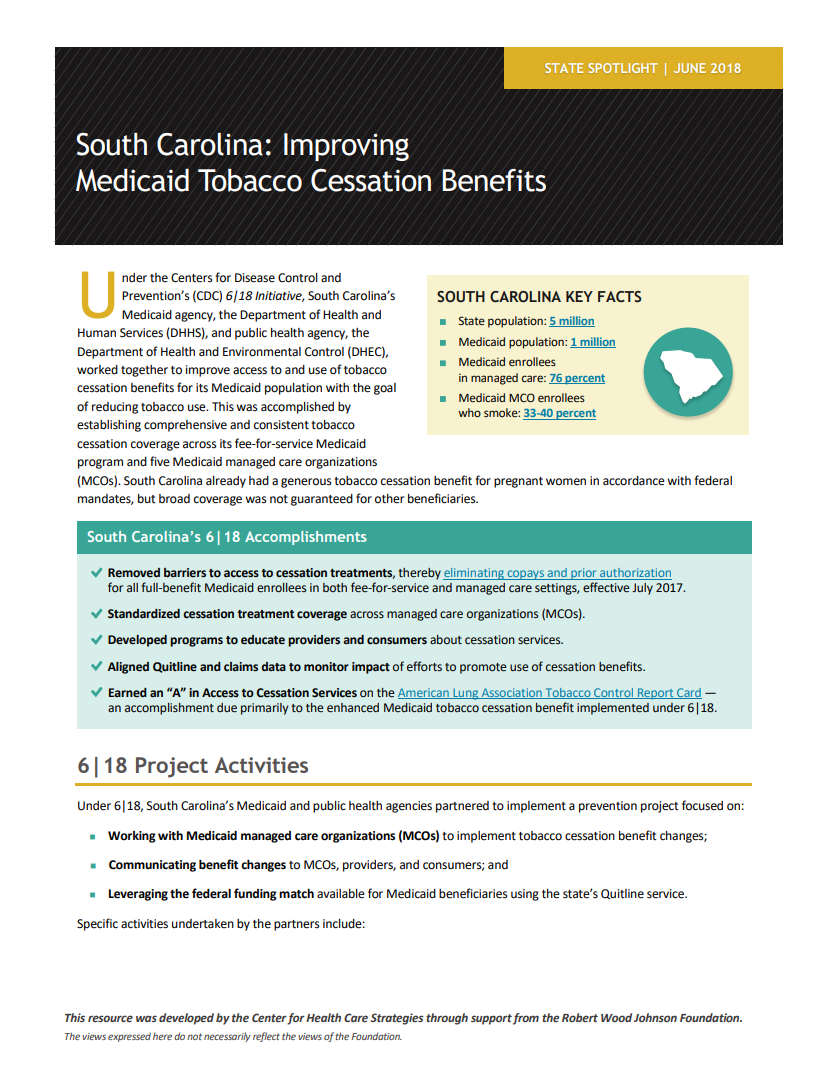South Carolina: Improving Medicaid Tobacco Cessation Benefits
SOUTH CAROLINA KEY FACTS
- State population: 5 million
- Medicaid population: 1 million
- Medicaid enrollees in managed care: 76 percent
- Medicaid MCO enrollees who smoke: 33-40 percent
South Carolina’s 6|18 Accomplishments
- Removed barriers to access to cessation treatments, thereby eliminating copays and prior authorization
for all full-benefit Medicaid enrollees in both fee-for-service and managed care settings, effective July 2017. - Standardized cessation treatment coverage across MCOs.
- Developed programs to educate providers and consumers about cessation services.
- Aligned Quitline and claims data to monitor impact of efforts to promote use of cessation benefits.
- Earned an “A” in Access to Cessation Services on the American Lung Association Tobacco Control Report Card —
an accomplishment due primarily to the enhanced Medicaid tobacco cessation benefit implemented under 6|18.
6|18 Project Activities
Under 6|18, South Carolina’s Medicaid and public health agencies partnered to implement a prevention project focused on:
- Working with Medicaid MCOs to implement tobacco cessation benefit changes;
- Communicating benefit changes to MCOs, providers, and consumers; and
- Leveraging the federal funding match available for Medicaid beneficiaries using the state’s Quitline service.
Specific activities undertaken by the partners include:
 1. MCO Outreach and Coverage Changes
1. MCO Outreach and Coverage Changes
South Carolina public health staff introduced the 6|18 Initiative to the state’s MCO medical directors during a January 2017 meeting, making the case for covering all tobacco cessation medications and counseling services without barriers, consistent with the 2008 Public Health Service Clinical Practice Guidelines. As a next step, South Carolina’s Medicaid and public health agencies created a survey for the state’s Medicaid MCOs to identify barriers related to prior authorization, co-pays, and utilization restrictions. The survey also sought to determine each MCO’s specific tobacco cessation benefit.
Using information gleaned from the MCO survey and background from the Robert Wood Johnson Foundation on Medicaid coverage in other states, South Carolina’s Medicaid agency worked with an actuarial firm to analyze how an enhanced cessation benefit would affect Medicaid capitation payments. Although the analysis suggested that MCO capitated rates would increase in Fiscal Year 2018, these charges were deemed reasonable when compared to the cost of providing care for tobacco-related illnesses. As of July 1, 2017, South Carolina offers a standard set of tobacco cessation services without co-payment or prior authorization to all full-benefit South Carolina Medicaid enrollees in fee-for-service or managed care settings.
 2. Communications Campaign and Evaluation Plan
2. Communications Campaign and Evaluation Plan
South Carolina Medicaid initially communicated the policy change via its provider bulletin, encouraging providers to call its service center hotline with questions. South Carolina public health gave presentations to MCO representatives about the new benefit, which resulted in MCOs developing their own promotional materials. South Carolina public health is developing a longer-term communications plan to promote the policy change to providers and consumers. The state plans to assess the impact of the benefit change by tracking utilization of the Quitline, physician counseling, and cessation medications, in addition to Consumer Assessment of Healthcare Providers and Systems (CAHPS) data on smoking rates from MCOs. The state will also assess the impact of the communication plan and audiences reached.
 3. Quitline Sustainability
3. Quitline Sustainability
The Medicaid provider bulletin on the enhanced tobacco cessation benefit, referenced above, encouraged referrals to the South Carolina Quitline, an evidence-based telephone cessation service available at no cost to all South Carolinians through DHEC. Under 6|18, South Carolina sought to leverage a 50 percent federal administrative match for state Quitline counseling provided to Medicaid enrollees that is available through the Centers for Medicare & Medicaid Services. DHHS and DHEC negotiated a contract in Fiscal Year 2018 to use the resulting federal match reimbursement to support Quitline counseling for Medicaid enrollees.
State Spotlights: Medicaid-Public Health Collaboration in CDC’s 6|18 Initiative
This profile is part of a series, developed by the Center for Health Care Strategies and made possible by the Robert Wood Johnson Foundation, that showcases how state Medicaid and public health departments are using the Centers for Disease Control and Prevention’s (CDC) 6|18 Initiative to accelerate the adoption of evidence-based prevention efforts focused on improving health outcomes and controlling health care costs. The CDC’s 6|18 Initiative links proven prevention activities to health coverage and delivery with a focus on six high-burden, high-cost health conditions — tobacco use, high blood pressure, inappropriate antibiotic use, asthma, unintended pregnancies, and diabetes.
